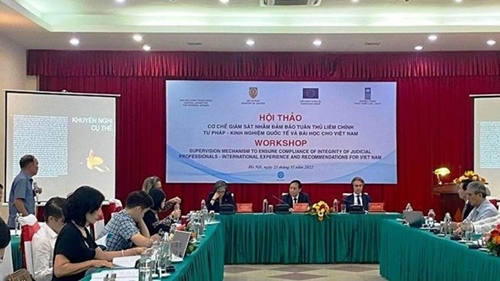The event was co-organized by the Party Central Committee’s Commission for Internal Affairs, the United Nations Development Program (UNDP) and the EU Delegation to Vietnam.
    |
 |
|
At the workshop (Photo: nhandan.vn) |
In his opening remarks, deputy head of the Commission for Internal Affairs Nguyen Thanh Hai stressed that the compliance of integrity is significant to ensuring a pure, strong judicial system, and supervision is to ensure integrity compliance.
The Vietnamese Party and State have issued a resolution on continuing to build and perfect a rule-of-law socialist State in the new period, he said, adding that opinions raised at the workshop are meaningful in terms of both theory and reality.
EU Ambassador to Vietnam Giorgio Aliberti said, “Legislation and regulation is one thing and actual implementation is another. Assessment of judicial practices leaves a lot of space for uncertainties, because collecting reliable data- for example on independence of justice- is not easy. Therefore it is key establish a mechanism for supervision and monitoring.”
He also made recommendations on how to improve and monitor the compliance with judicial integrity, such as implementing the principle of rotation of the judicial professionals, specific training focusing on ethical standards, raising legal awareness and citizen’s right to access information, and establishing a national judicial council governing the court system and in charge of infrastructure, training, selection, promotion and appointment, reward and discipline of judges and chief justices of courts.
UNDP Resident Representative in Vietnam Ramla Khalidi commended the country for making good progress in judiciary reform toward promoting the core values of independence, impartiality, personal integrity, propriety, equality, competence and diligence.
“Laws and policies on anti-corruption and promotion of judicial integrity as well as supervision mechanisms of judicial integrity are well established. The development of Codes of conducts/ethics for Judges (2018), prosecutors (2017) and lawyers (2019) are clear examples of the progress made until now,” said Khalidi.
“However, the gaps remain in the implementation and enforcement of these instruments. Establishing a National Judicial Council, reviewing relevant laws, such as the law of lawyers, increasing public access to information and enhancing the roles of media in anti-corruption discourse, especially in the judicial sector are some of the recommendations for closing the gaps.”
She also lauded the commission for its leadership and tremendous efforts in promoting the integrity, transparency and accountability of the judicial professionals.
Source: VNA